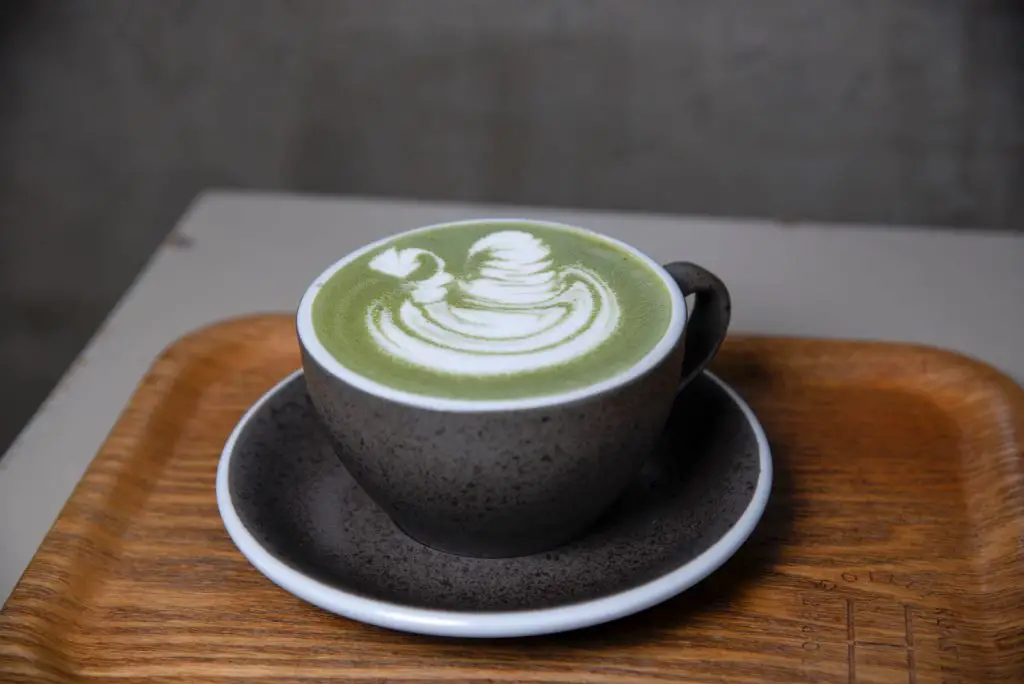Caffeine is a popular pick-me-up for millions of people worldwide, but what if you could choose an alternative that packs more punch? Matcha green tea is quickly becoming the go-to for many who want to get the most out of their caffeine.

But how does matcha differ from coffee? In this article, we’ll explore the differences between matcha and coffee, discussing the various benefits and drawbacks of each. We’ll look at things like daily caffeine limits suggested by the FDA and make recommendations on which one may be better suited to your lifestyle.
So sip up and stay tuned as we delve into this energizing comparison!
Key Takeaways
- Matcha tea provides a more stable caffeine hit compared to coffee, thanks to the presence of L-theanine which slows down caffeine absorption.
- Matcha tea offers a host of health benefits, including reduced cholesterol levels, lower blood pressure, regulated energy levels, and possible prevention of health issues like dementia and cancer.
- Matcha tea is better for oral health, reduces plaque build-up, and actively reduces the rate of bacteria growth within the mouth, unlike coffee which can cause coffee breath and staining of teeth.
- Choosing an organic product like Encha matcha powder is crucial for the best results, and frequent coffee drinkers should look for a less strongly caffeinated alternative like matcha.
Matcha Benefits
Matcha offers a range of health benefits that make it a healthier alternative to coffee for daily drinkers. These benefits include reduced cholesterol, lower blood pressure, and regulated energy levels. Matcha contains caffeine, but with significantly less content than coffee, only offering 50mg of caffeine per serving compared to between 100mg and 200mg for most coffees. The L-theanine in matcha ensures that the caffeine is absorbed into the body at a slower rate, resulting in a more stable energy boost and no withdrawal symptoms like in coffee.
In addition to these benefits, consuming matcha powder is associated with numerous other health benefits. It helps prevent staining of teeth while actively reducing plaque buildup and bacteria growth within the mouth. It also helps regulate blood sugar levels and reduce stress levels, which improves mental and physical wellness.
Matcha green tea is made from finely ground powder made from tencha leaves, which can be used to brew tea, latte, or smoothie beverages. Choosing an organic product like Encha matcha powder is crucial for obtaining the best results from this luxurious green tea drink.
Better Caffeine Alternative
If you’re looking for a better alternative to coffee, matcha is the perfect choice. It offers 50mg of caffeine per serving compared to between 100-200mg from most coffees. One of the major benefits of matcha is that its high content of L-theanine amino acid helps regulate blood sugar levels and provides an energy boost without the jitters typically associated with drinking coffee.
Drinking matcha also helps reduce cholesterol, lower blood pressure, regulate energy levels, support weight loss, and may even prevent health issues like dementia and cancer – all without any withdrawal symptoms or staining effects on teeth like coffee can have. Matcha contains much more antioxidants than other green teas because it’s made from finely ground powder made from tencha leaves and is, therefore, richer in nutrients such as vitamins A & C than regular green tea.
It also has a unique taste that many people love thanks to its earthy yet sweet flavor profile which makes it great for brewing tea, lattes, or smoothies. With its numerous health benefits and delicious taste, switching to matcha could be the best decision you make when looking for a healthier caffeine alternative.
Health Benefits
Switching to matcha has numerous health benefits that make it a far superior option to coffee. These benefits include reduced cholesterol, lower blood pressure, regulated energy levels, supported weight loss, and potential prevention of health issues like dementia and cancer. Matcha has been found to contain high concentrations of antioxidants such as EGCG which can help reduce the risk of chronic diseases.
When comparing matcha caffeine vs black tea caffeine content, studies have shown that matcha contains more catechins than black tea which increases its potency and efficacy in promoting overall wellness. Additionally, the amount of caffeine present in matcha is much less than what is found in coffee. This means that although you get an energy boost from drinking matcha tea, you will not experience any jitters or other adverse effects associated with consuming too much caffeine like increased heart rate or anxiety.
Furthermore, because the L-theanine content helps regulate the absorption rate of caffeine into your body, you will not experience withdrawal symptoms like those experienced with regular coffee consumption either.
Oral Health Advantages
By enjoying matcha instead of coffee, you can actively reduce the rate of bacteria growth in your mouth and prevent plaque build-up, allowing for a healthier smile.
Matcha contains polyphenols that inhibit oral bacteria growth, which prevents dental decay and helps maintain healthy teeth and gums.
Matcha is also naturally low in sugar, meaning it won’t contribute to tooth decay like sugary drinks often do.
In comparison to coffee, matcha offers an equally stimulating experience without the harshness on the teeth that comes with drinking coffee. Plus, unlike coffee, matcha has no staining effects on your teeth – making it a great choice for anyone looking to keep their pearly whites pristine!
No Withdrawal Symptoms
Enjoying matcha tea means never having to worry about the withdrawal symptoms that come with cutting off coffee cold turkey. Unlike coffee, which can cause headaches, nausea, and extreme fatigue when stopped suddenly, matcha powder is safe to drink on a daily basis and can be taken as a break without any undesirable side effects or withdrawal symptoms.
This is due to the presence of L-theanine in matcha tea which helps slow down the absorption rate of caffeine into the body. Additionally, studies have shown that switching from coffee to matcha can help reduce stress levels and improve mental and physical wellness. Matcha’s calming effect has also been proven to regulate blood sugar levels better than coffee does.
All these benefits make it an ideal choice for those looking for a healthier alternative to their daily caffeine intake.
Frequently Asked Questions
What type of tea is matcha?
Matcha is an ancient Japanese tea made from finely ground green tea leaves. It’s an invigorating alternative to coffee, providing a stable energy hit and numerous health benefits. Experience the joy of matcha today for a more mindful and healthier lifestyle!
How much caffeine is in matcha green tea?
Matcha green tea contains about 50mg of caffeine per serving, significantly less than the average cup of coffee. Enjoy its many health benefits without the negative side effects associated with higher levels of caffeine.
Are there any other health benefits besides reducing cholesterol, lowering blood pressure, and supporting weight loss?
Yes! Matcha tea can reduce stress levels, improve mental and physical wellness, and even add a sprinkle of joy to your routine.
Is matcha tea safe for pregnant women to drink?
Pregnant women should talk to their doctor before adding matcha tea to their diet. It has many health benefits, but it contains caffeine and can impact fetal development.
